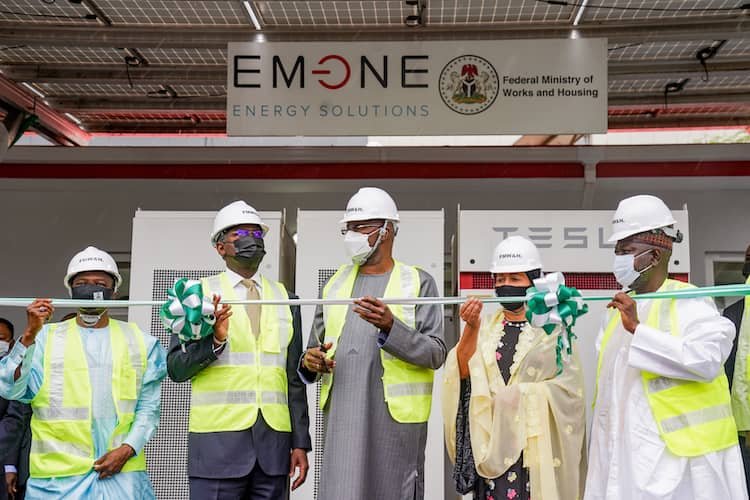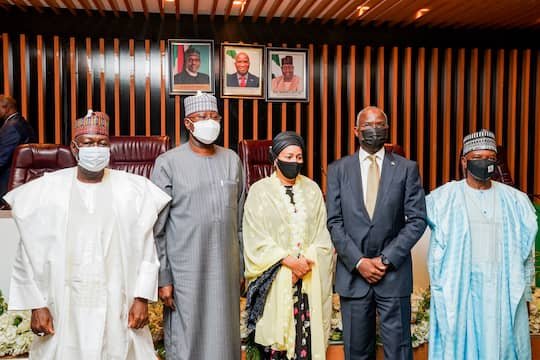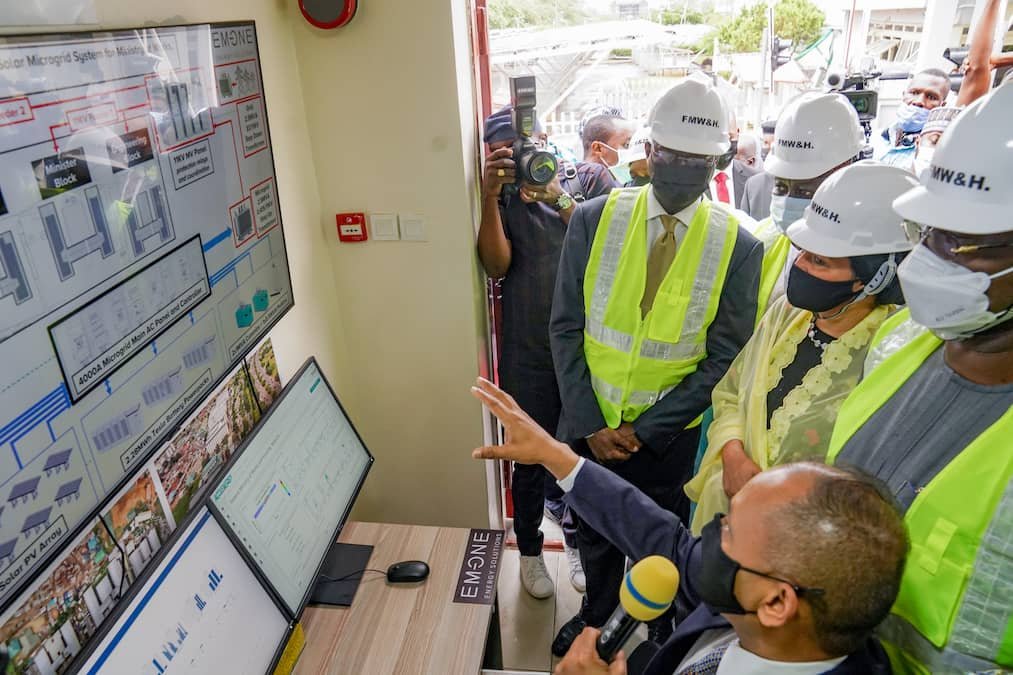There was once a global resolve to reduce carbon emissions by committing to renewable energy sources, which was the key discussion at the Paris Agreement.
During the meeting, it would be recalled that President Muhammadu Buhari cited a 1.52 megawatts solar farm his team earlier described as the largest solar project for any public building in Africa.
The selling point of this project was that it would enable the nation to reduce carbon emission, as it’s contributing to saving the planet for the future generation.
Utilising Renewable Energy in Nigeria
Just yesterday, President Buhari commissioned a 1.52 Megawatts Solar Mini-grid System and Energy retrofitting of the Federal Ministry of Works and Housing Headquarters in Mabushi, Abuja, saying the project was in line with his Administration’s pursuit of off-grid as its focal policy.
President Buhari, who was represented at the occasion by the Secretary to the Government of the Federation, Mr Boss Mustapha, said in addition to policy implementation, the project also enables Nigeria to fulfil commitments made with other countries of the world under the Paris Climate Change Agreement which he signed on behalf of Nigeria.
“Another reason why I am pleased about this project is the impact of reliable energy on the ability of our public servants housed in these buildings to discharge their responsibilities to members of the public efficiently”, he said, adding that as a critical enabler of the Private Sector, the improved efficiency in public service delivery should translate to an improvement in the ease of doing business.
The President, who pointed out that ease of doing business “is a major objective of our economic plans to grow the Nigerian economy and create jobs”, further assured Nigerians of his Administration’s commitment towards promoting energy efficiency and ensuring energy security to all Nigerians.
He disclosed that the Government has just embarked on the competitive procurement of up to 150 Mega Watts of solar power along the Maiduguri axis to help address the issue of electricity supply while enhancing grid stability through the provision of clean, renewable energy.
According to him, the President commended Ministers and staff of the Ministry, Works and Housing, and the contractor for the successful delivery of the project, which, according to him, “hopefully is just the first of many more to be delivered across Nigeria in the public and private sectors”.
Investing in Off-Grid Power Project: A Reliable-Renewable Energy

The Minister of Works and Housing, Mr Babatunde Fashola, while delivering his keynote address, said the investment in Mini-Grid by the Ministry aligned with the Buhari Administration’s policy to promote off-grid options as a way of making more of the on-grid power available to ordinary Nigerians who cannot afford the cost of investing in the off-grid option.
Fashola said, based on the mandate of the Federal Executive Council, which, according to him, approved the project on March 20, 2019, a 1.52 Mega-Watts Solar System has been delivered that would provide uninterrupted power supply to five blocks housing the Ministry of Works and Housing and Ministry of Environment and Lands.
In fulfilling the Federal Government’s Economic Recovery and Growth Plan, ERGP, of creating jobs, the minister also employed 382 artisans and 176 skilled workers throughout its duration.
According to him, such a massive reduction in diesel consumption would translate to cost savings of N270,945,000 over 20 years of the system’s life while also contributing to reducing government operational expenses and reducing recurrent expenditure.
Other deliverables from the project, he said, include the upgrade and retrofitting of the Ministry’s electrical appliances by replacing 400 old Air-conditioning units with 400 new inverter-based energy-efficient Air-conditioning units and replacing 2,600 old light fittings with energy-efficient LED ones, which according to him “are energy-saving because they consume 40 per cent less energy.”
In terms of local content, Fashola said the contract had engaged five STEM candidates to work throughout the solar PV lifecycle of the project, with two candidates trained in engineering design and another two in project construction, while one candidate got trained in engineering projects management.
Urging other government agencies to follow the same path, the Minister declared, “With this investment we have built our own Mini-Grid, in consonance with our Administration’s policy to promote off-grid option, thereby making more of the on-grid power available to ordinary Nigerians who cannot afford the cost of investing in off-grid power.
“All I need now say is that other government buildings can follow this path and our team will be most enthusiastic about providing the support, and share our experiences and lessons learned, working with the Ministry of Power”, he said, adding that the Ministry of Finance has already indicated interest and the team has begun the energy audit of the Ministry.
He expressed deep appreciation to the contractor, Messrs. EM-ONE Energy Solutions, “for the efficient execution and more importantly for the sacrifice to complete this project despite the wide disparity between the foreign exchange rates in 2019 when the project was awarded and now, notwithstanding high importation costs of the parts”.
Fashola also acknowledged the contributions of Mrs Damilola Ogunbiyi and Engr. Femi Akinyelure, two young people whom the President appointed to the Rural Electrification Agency (REA) and who were part of the project at different stages from inception to completion, recalling that the two and their colleagues were involved in the energy audit and design of the project.
“They represent the positive impact of youth involvement in public service”, the Minister said as he also commended Engr. Julius Olurinola, the Director of Engineering Services, “whose role I liken to that of a midwife, supervising, monitoring and reporting the progress of this project from incubation to delivery”.
Inviting the President to commission the project, Fashola declared, “I have the pleasure to now invite you, Sir, to perform the official commissioning of the 1.52 Mega-Watts Solar Power project to provide uninterrupted power to your staff in the Ministry of Works and Housing and Environment to improve their working conditions”.
In his goodwill message, the Minister of Environment, Dr Mohammad Abubakar, commended the Minister and the Ministry of Works and Housing to complete the project, noting that it would enable the user Ministries to improve productivity.
Describing the project as a remarkable achievement, the Minister commended the resilience and diligence of the Ministerial Team led by the Minister in completing the project and urged other Ministries and government agencies to follow suit “in line with Climate Change”.
UN on Nigeria Achieving Zero Carbon Emission Status

Also, in her goodwill message, the Deputy Secretary-General of the United Nations and former Minister of Environment, Mrs Amina Mohammed, commended the Minister of Works and Housing for the successful completion of the project, pointing out that it is a demonstration of Nigeria’s adherence to the global efforts towards zero-emission.
Noting that solar energy installation across the world was creating three times more jobs than the use of fossil fuel, the former Environment Minister added that more countries needed to embrace solar, especially in Africa.
She said the successful completion of the project, aside from improving productivity, highlights Nigeria’s development and leadership in renewable energy in the African Continent.
Earlier, in his Welcome Address, the Minister of State for Works and Housing, Engr. Abubakar Aliyu said the successful completion of the project had brought a solution to the Ministry’s challenges brought about by fossil fuel use.

